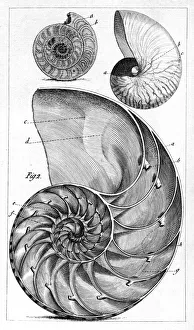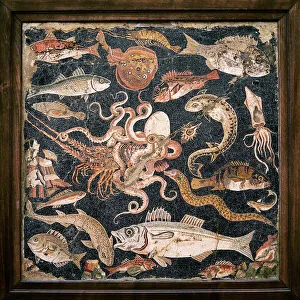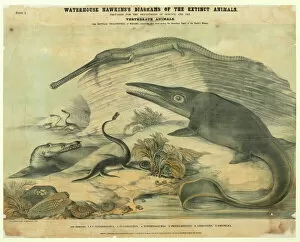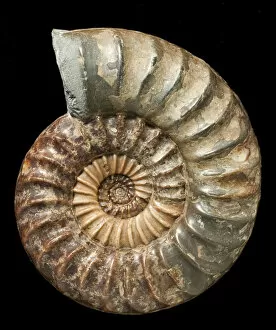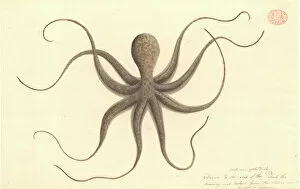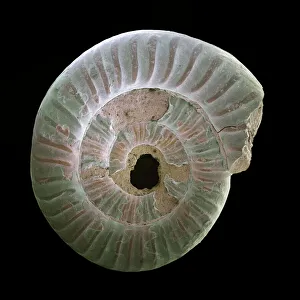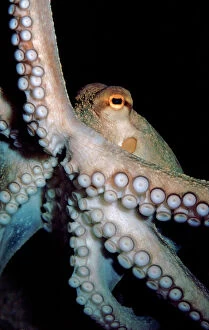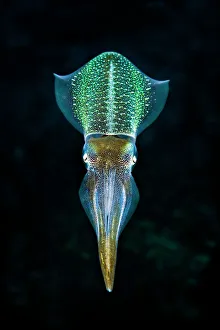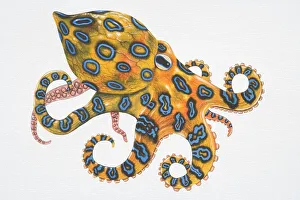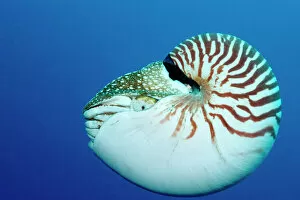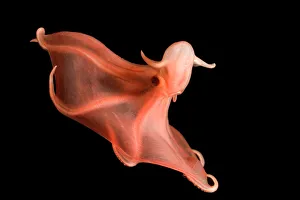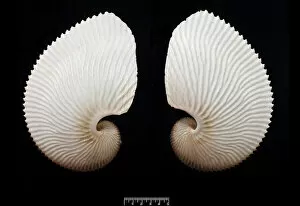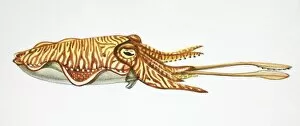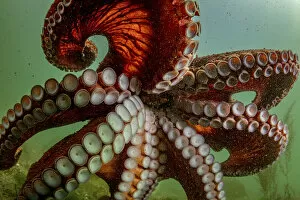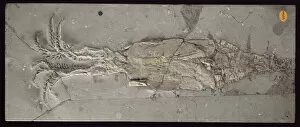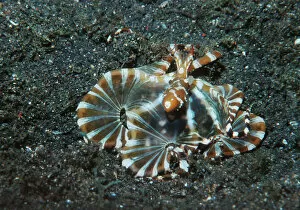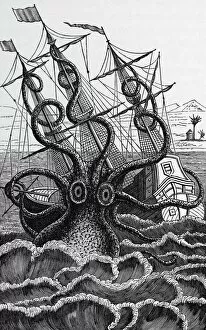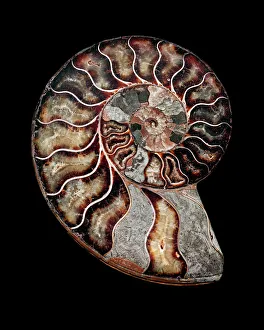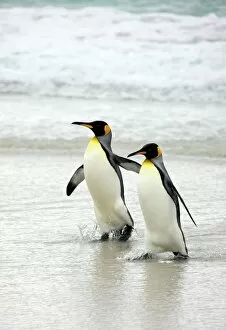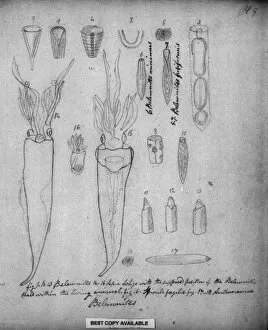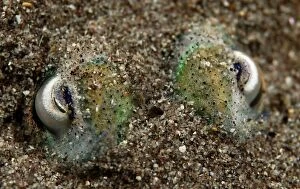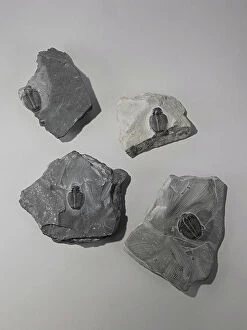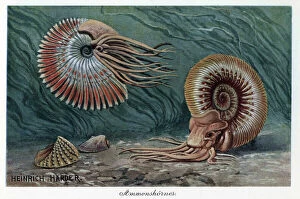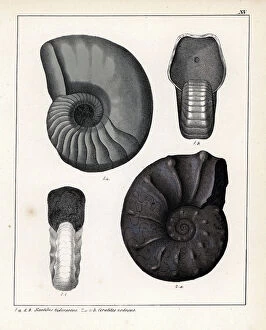Cephalopods are a type of mollusk, which includes animals such as octopuses, squid, and cuttlefish, and are characterized by their well-developed heads and arms or tentacles. They have the most complex nervous systems of all invertebrates, allowing them to be highly intelligent and maneuverable. They also have excellent vision and can rapidly change color for camouflage or communication purposes and can found in all oceans around the world from shallow waters to deep sea trenches. They feed on fish, crustaceans, worms, and other mollusks using their sharp beaks to tear apart prey items. Some species use ink for defense while others use jet propulsion to escape predators quickly. Cephalopods play an important role in marine ecosystems as both predators and prey species that help maintain balance in the food chain.
Media Storehouse offers a stunning collection of wall art and framed prints featuring Cephalopods, which are mollusk animals. Our collection showcases the beauty and diversity of these fascinating creatures that include octopuses, squids, cuttlefishes, and nautiluses. Each print is carefully selected to highlight the unique features of each species, from their intricate patterns to their mesmerizing colors. The Cephalopod collection includes both photographs and illustrations that capture the essence of these intelligent creatures in their natural habitats. These artworks make for an excellent addition to any home or office space as they not only add aesthetic value but also serve as educational tools for those interested in marine life. Whether you're looking for a striking centerpiece or a subtle accent piece, our Cephalopod collection has something for everyone. With high-quality printing techniques and premium materials used in every product offered by Media Storehouse, customers can be assured that they are getting nothing but the best when it comes to wall art and framed prints.
Cephalopods art prints are a collection of high-quality, professionally printed artworks featuring various species of cephalopods. Cephalopods are a group of marine animals that belong to the phylum Mollusca and include creatures such as octopus, squid, cuttlefish, and nautilus. These fascinating creatures have unique physical characteristics such as tentacles or arms with suction cups for grasping prey and ink sacs for defense mechanisms. The Cephalopods art prints showcase the beauty and complexity of these creatures through stunning photography and artwork. The prints come in a range of sizes to suit any space or decor style, making them perfect for home or office display. Whether you're an animal lover looking to add some marine life to your walls or simply appreciate the intricate beauty of nature's creations, these art prints offer something truly special. They make great gifts for anyone who loves sea life or wants to add some color and interest to their living space.
We offer a wide range of cephalopod art prints for purchase. These include stunning images of octopuses, squids, and cuttlefish in various poses and settings. The prints are available in different sizes to suit your needs and can be printed on high-quality paper or canvas. Some popular options include close-up shots of the intricate patterns on an octopus's skin, photographs capturing the mesmerizing movements of squid swimming through the ocean depths, and artistic renditions that showcase these fascinating creatures' unique features. Whether you're looking to add some marine-themed decor to your home or office space or simply appreciate the beauty of these intelligent mollusks animals, we have something for everyone. With our extensive collection of cephalopod art prints, you're sure to find a piece that speaks to you.
To buy Cephalopods art prints from Media Storehouse, you can browse through our collection of high-quality images featuring various species of cephalopods. Once you have found the print that you like, simply click on it to view its details and select the size and format that suits your needs. We offer a range of options for printing your chosen image, including canvas prints, framed prints, and photographic prints. You can also choose to have your print mounted or laminated for added durability. To complete your purchase, simply add the item to your cart and proceed to checkout. We accept a variety of payment methods, including credit cards and PayPal. Whether you are looking for a stunning piece of wall art or a unique gift for someone special, our collection of Cephalopods art prints is sure to impress.
We offer a wide range of Cephalopod art prints at varying prices. Our collection includes high-quality prints featuring various species of mollusk animals such as octopuses, squids, and cuttlefishes. The cost of each print depends on several factors such as the size, quality, and type of paper used. We have affordable options for those who are looking to decorate their homes or offices with beautiful cephalopod art pieces without breaking the bank. On the other hand, we also offer premium prints that are perfect for collectors or enthusiasts who want to invest in top-notch artwork. Regardless of your budget or preference, you can find an impressive selection of Cephalopod art prints at Media Storehouse that will suit your needs. We take pride in providing our customers with high-quality products that showcase the beauty and uniqueness of these fascinating creatures.
We take great care to ensure that your Cephalopods art prints are delivered to you in the best possible condition. We use high-quality packaging materials and employ a range of delivery options to ensure that your order arrives safely and securely. Depending on the size and quantity of your order, we may use standard postal services or courier companies for delivery. All orders are tracked so that you can keep an eye on their progress from dispatch to arrival. Our team takes pride in ensuring that all orders are processed quickly and efficiently, with most orders being dispatched within 24 hours of receipt. If you have any questions about our delivery process or would like more information about tracking your order, please don't hesitate to get in touch with us via our customer service team who will be happy to help.

